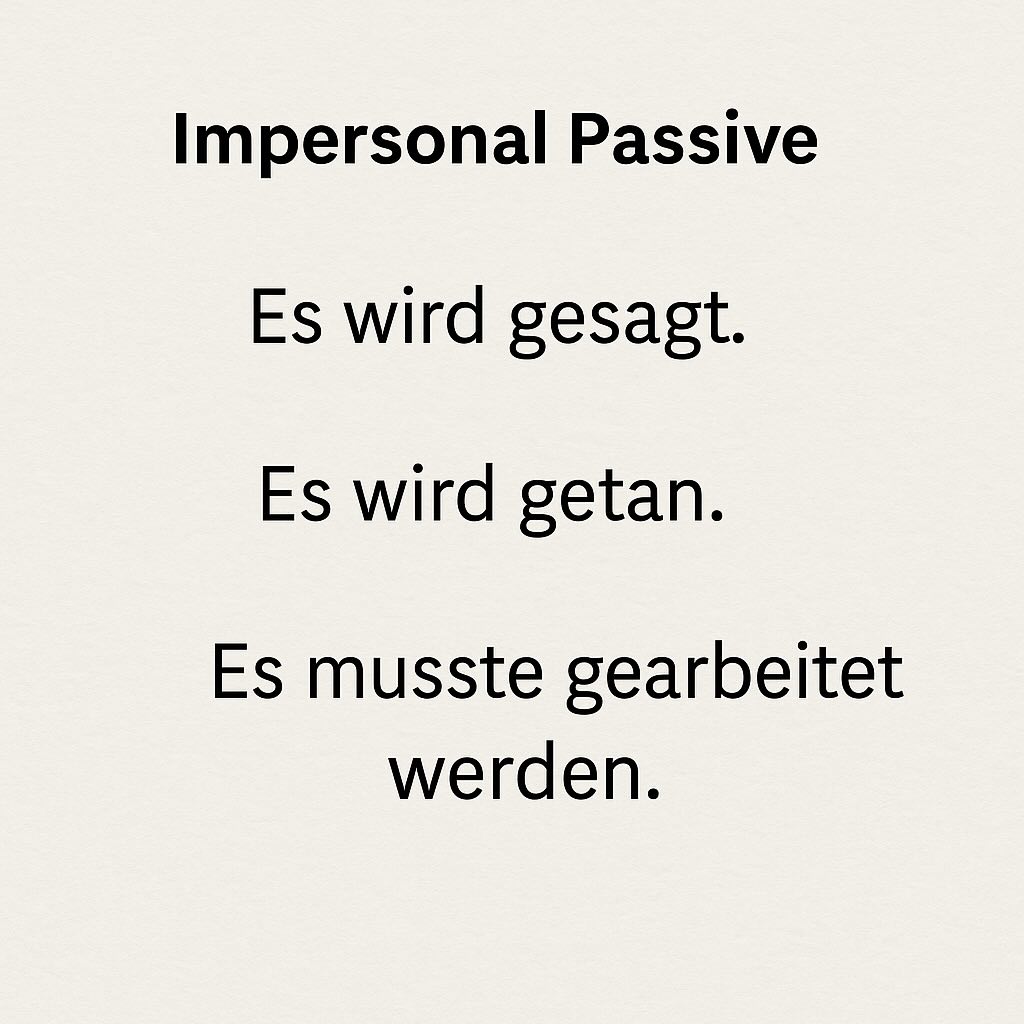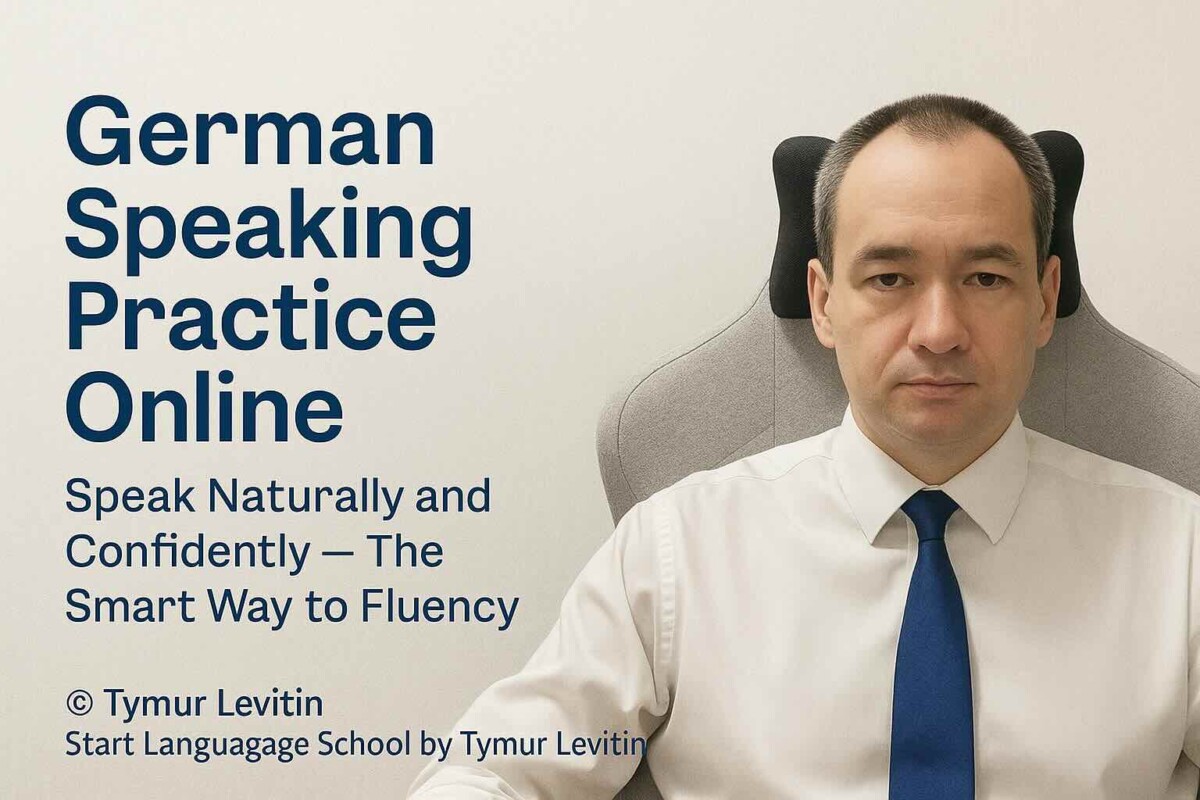The Impersonal Passive (Agentless Style)
“Sometimes it doesn’t matter who does it. What matters is that it is done.” — Tymur Levitin
The paradox before we start: “But where is the subject?”
German requires every finite verb to have a subject. So how can passive exist without one?
- Workaround: German inserts the dummy subject “es” (Es wird getan.).
- In reality: This es often disappears in main clauses if the word order is clear (Wird getan.).
- So: impersonal passive exists in German, but it bends the “every clause must have a subject” rule.
👉 This paradox explains why English says “It is said” and German says “Es wird gesagt” (or just “wird gesagt”).
What is the impersonal passive?
It’s the passive form of intransitive verbs — verbs that don’t normally take a direct object.
- Active: Man sagt, dass er krank ist. → “People say that he is ill.”
- Impersonal passive: Es wird gesagt, dass er krank ist. → “It is said that he is ill.”
Here, no actor is mentioned. The subject position is filled by es (or dropped).
Core patterns
- Präsens: Es wird getan. → “It is done.”
- Präteritum: Es wurde getan. → “It was done.”
- Perfekt: Es ist getan worden. → “It has been done.”
- Plusquamperfekt: Es war getan worden. → “It had been done.”
- Futur I: Es wird getan werden. → “It will be done.”
- Futur II: Es wird getan worden sein. → “It will have been done.”
Typical verbs used in impersonal passive
- Verbs of speaking: sagen, berichten, erzählen, meinen.
- Verbs of thinking: glauben, vermuten, erwarten.
- General activity verbs: arbeiten, tanzen, schlafen, helfen.
Examples:
- Es wird viel gearbeitet. → “A lot of work is being done.”
- Es wurde getanzt. → “There was dancing.”
- Es wird gesagt, er komme morgen. → “It is said he is coming tomorrow.”
Special cases: modal verbs in impersonal passive
- Es muss gearbeitet werden. → “Work must be done.”
- Es konnte geholfen werden. → “Help could be given.”
- Es hat gearbeitet werden müssen. → “Work had to be done.” (heavy cluster, exam-safe)
⚠️ Pitfall: Don’t try worden with a modal (Es ist gearbeitet worden können). Same rule as in Part 4: with modals, use Ersatzinfinitiv (werden müssen/können), not participles.
Word order and the dummy “es”
- At the beginning: Es wird gesagt, dass …
- Dropped if another element fills the first position:
Heute wird getanzt. (not Es heute wird getanzt.)
👉 Rule of thumb:
- Keep es in neutral statements.
- Drop es when you put something else at the front (adverbials, time phrases).
Comparison: impersonal passive vs “man”-construction
- Man sagt, er sei krank. (active with generic subject “man”).
- Es wird gesagt, er sei krank. (impersonal passive).
Both mean “It is said…”.
- man = feels more personal/colloquial.
- impersonal passive = more formal/academic/neutral.
Common pitfalls
- Not every intransitive works.
– Es wird geschlafen. (ok)
– Es wird gegangen. (awkward, better use man geht). - Overusing es.
– Don’t say: Es heute wird getanzt.
– Correct: Heute wird getanzt. - Confusion with English “they say.”
– They say… = Es wird gesagt… OR Man sagt…
Both are valid, but the nuance differs.
Exam survival tips
- Use impersonal passive to avoid naming the subject.
- Safe in Präsens/Präteritum/Perfekt.
- With modals: always form werden + modal infinitive at the end (Es hat getan werden müssen).
- Don’t confuse with man. In formal writing, prefer impersonal passive.

Series navigation
- Part 1: The Myth of Three Passive Forms
- Part 2: Passive Tenses Without Modals
- Part 3: Passive with Modal Verbs
- Part 4: All Tenses in Full
- Part 5: Recipient Passive
- Part 6: Impersonal Passive (this page)
- Part 7: Passive in Konjunktiv
- Part 8: Academic Passive
- Part 9: The Translation Lab
- Part 10: Survival Strategies
About the author
Tymur Levitin — Founder, Head Teacher & Translator
Author’s rights
© Tymur Levitin — Levitin Language School / Start Language School by Tymur Levitin
Global Learning. Personal Approach.
























